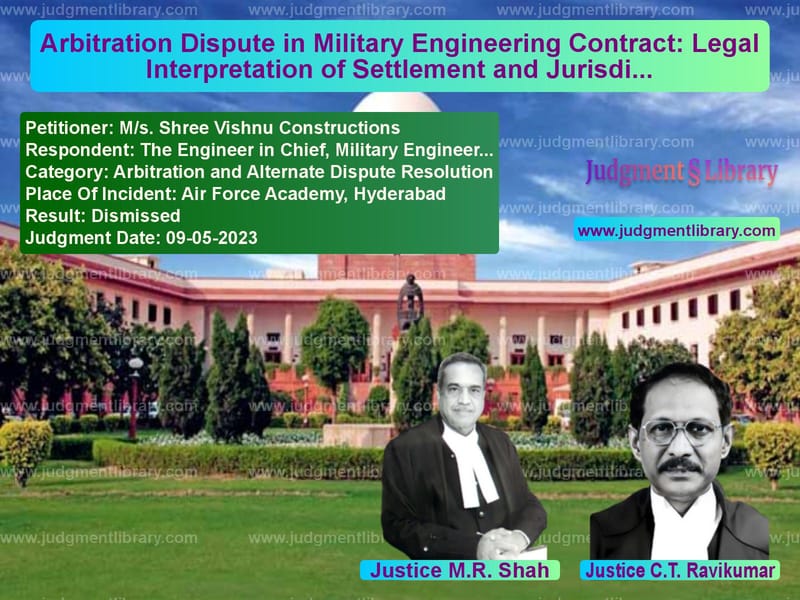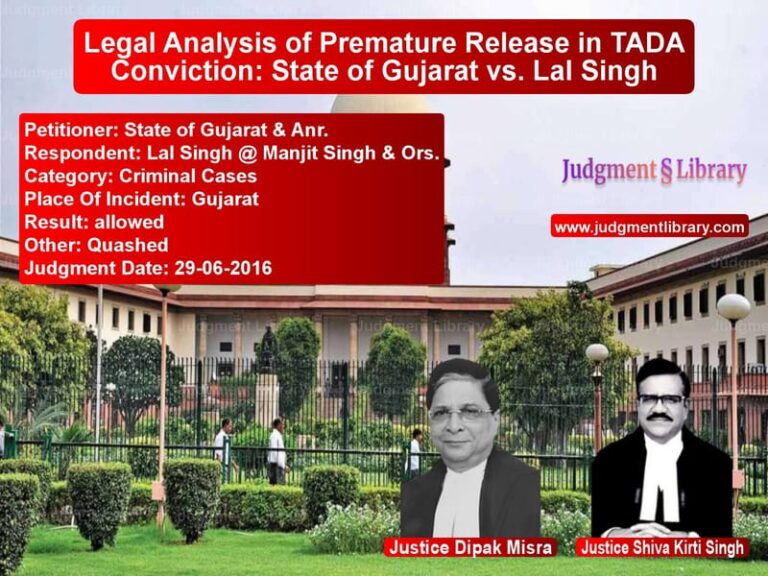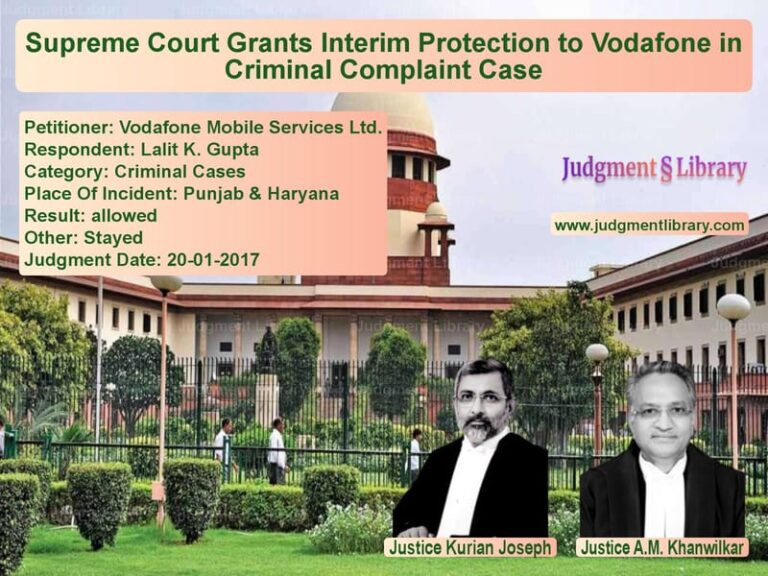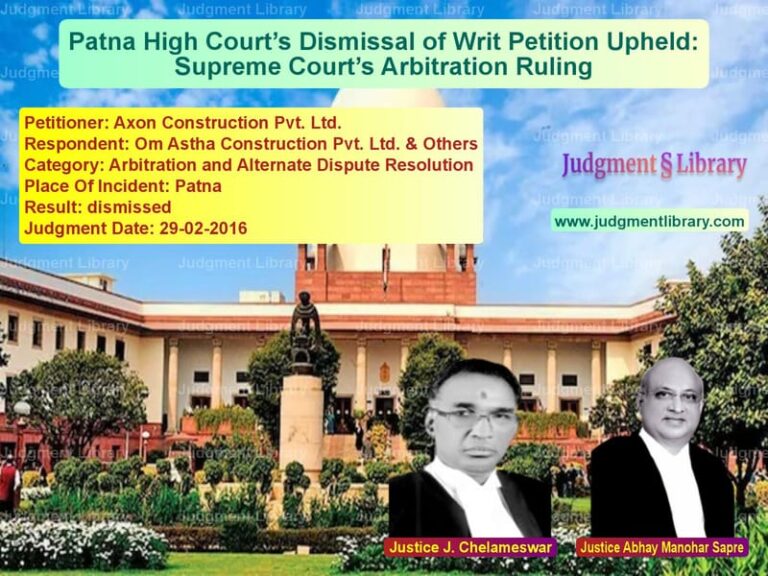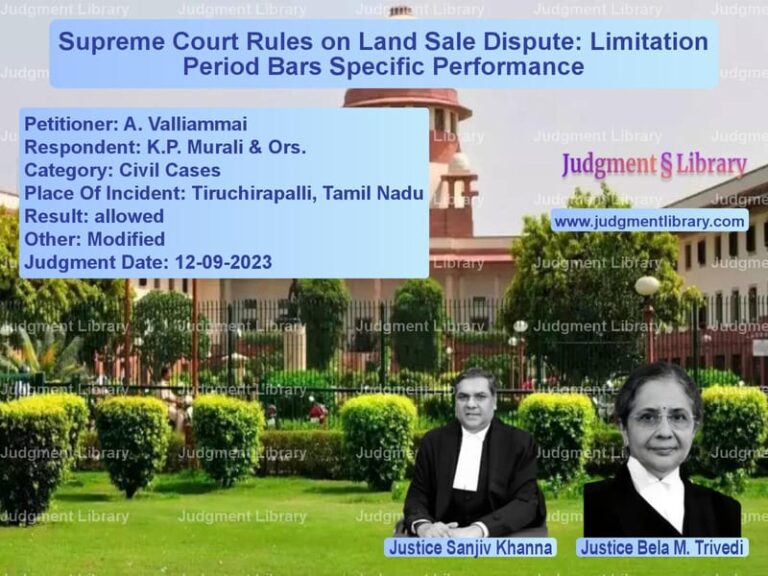Arbitration Dispute in Military Engineering Contract: Legal Interpretation of Settlement and Jurisdiction
The case of M/s. Shree Vishnu Constructions v. The Engineer in Chief, Military Engineering Service & Ors. is a significant legal battle concerning arbitration disputes in government contracts. The case revolves around whether an arbitration agreement remains enforceable after a contractor signs a ‘No Further Claim’ certificate and whether the amendments introduced by the Arbitration and Conciliation (Amendment) Act, 2015 apply to pending cases.
The appellant, M/s. Shree Vishnu Constructions, entered into an agreement on July 22, 2010, for construction and repair work at the Air Force Academy, Hyderabad. The final bill was settled on April 29, 2013, and the contractor issued a ‘No Further Claim’ certificate. However, the contractor later invoked arbitration, which was denied by the Military Engineering Service, leading to litigation.
Background of the Dispute
The appellant filed a petition under Section 11 of the Arbitration and Conciliation Act, 1996, to appoint an arbitrator, arguing that the contract contained an arbitration clause. The High Court dismissed the petition, holding that:
- The contractor had accepted the final settlement amount and signed a ‘No Further Claim’ certificate.
- Since the contractor had not raised any dispute at the time of settlement, arbitration was not necessary.
- The amendments made by the 2015 Amendment Act would not apply retrospectively.
The contractor, dissatisfied with this ruling, approached the Supreme Court of India.
Petitioner’s Arguments
The appellant presented the following arguments:
- The issuance of a ‘No Further Claim’ certificate should not bar arbitration, as it was issued under duress.
- The amendments introduced by the Arbitration and Conciliation (Amendment) Act, 2015, should apply to cases filed after its enactment.
- The Board of Control for Cricket in India (BCCI) v. Kochi Cricket Private Ltd. (2018) judgment supports the view that amendments apply prospectively to court proceedings initiated after 2015.
- The High Court should have appointed an arbitrator and left the issue of ‘accord and satisfaction’ to the arbitral tribunal.
Respondent’s Arguments
The Military Engineering Service, representing the government, opposed the appeal on these grounds:
- The contractor had willingly accepted the final payment without raising any dispute.
- Section 26 of the Arbitration and Conciliation (Amendment) Act, 2015, clearly states that the amendment does not apply to cases where arbitration proceedings commenced before its enactment.
- The case was governed by the pre-amendment arbitration law, which allowed the court to examine the existence of disputes before referring a matter to arbitration.
- The Parmar Construction Company v. Union of India (2019) ruling supported the view that amendments did not apply retrospectively to arbitration proceedings commenced earlier.
Supreme Court Judgment
The Supreme Court of India, in a judgment delivered by Justice M.R. Shah and Justice C.T. Ravikumar, upheld the High Court’s ruling. The court analyzed the following key legal questions:
1. Does the ‘No Further Claim’ Certificate Bar Arbitration?
The court observed that the contractor had accepted the final bill without protest and had explicitly certified that no further claims existed. The judgment stated:
“Once the contractor has given a ‘No Further Claim’ certificate and accepted the payment in full and final settlement, the dispute cannot be raised later through arbitration.”
The court reaffirmed that arbitration clauses cannot be invoked if the dispute itself has been settled between the parties.
2. Applicability of the 2015 Amendment Act
The key issue was whether the Arbitration and Conciliation (Amendment) Act, 2015, applied to the present case. The appellant relied on BCCI v. Kochi Cricket Pvt. Ltd. (2018), which held that the amendment applies prospectively to cases filed after 2015.
However, the Supreme Court disagreed, holding that:
- The arbitration process commenced when the dispute was first raised in 2013, long before the 2015 amendment.
- Section 21 of the Arbitration Act specifies that arbitration proceedings begin when a request for arbitration is received by the respondent.
- The judgment in Parmar Construction Company v. Union of India (2019) held that if arbitration was invoked before 2015, the pre-amendment law applies.
The court ruled:
“In a case where the notice invoking arbitration is issued prior to the Amendment Act, 2015, the old Act shall be applicable.”
3. Jurisdiction of Courts Under Section 11(6A)
The appellant argued that, as per the 2015 amendments, courts should only determine whether an arbitration agreement exists and should not examine disputes about final settlements.
The Supreme Court rejected this argument, emphasizing that the 2015 amendments did not apply in this case. The court reiterated that:
“Where arbitration proceedings commenced before the 2015 Amendment Act, the pre-amendment provisions apply, and courts can determine whether a genuine dispute exists before referring a matter to arbitration.”
Final Ruling
The Supreme Court dismissed the appeal, holding that:
- The contractor had accepted the final settlement voluntarily.
- The arbitration agreement could not be invoked after issuing a ‘No Further Claim’ certificate.
- The 2015 amendments did not apply since arbitration was invoked before their enactment.
- The High Court was correct in refusing to appoint an arbitrator.
With this ruling, the court reinforced the principle that arbitration cannot be used as a post-settlement strategy to reopen disputes that have already been resolved.
Petitioner Name: M/s. Shree Vishnu Constructions.Respondent Name: The Engineer in Chief, Military Engineering Service & Ors..Judgment By: Justice M.R. Shah, Justice C.T. Ravikumar.Place Of Incident: Air Force Academy, Hyderabad.Judgment Date: 09-05-2023.
Don’t miss out on the full details! Download the complete judgment in PDF format below and gain valuable insights instantly!
Download Judgment: ms.-shree-vishnu-co-vs-the-engineer-in-chie-supreme-court-of-india-judgment-dated-09-05-2023.pdf
Directly Download Judgment: Directly download this Judgment
See all petitions in Arbitration Awards
See all petitions in Dispute Resolution Mechanisms
See all petitions in Settlement Agreements
See all petitions in Judgment by Mukeshkumar Rasikbhai Shah
See all petitions in Judgment by C.T. Ravikumar
See all petitions in dismissed
See all petitions in supreme court of India judgments May 2023
See all petitions in 2023 judgments
See all posts in Arbitration and Alternate Dispute Resolution Category
See all allowed petitions in Arbitration and Alternate Dispute Resolution Category
See all Dismissed petitions in Arbitration and Alternate Dispute Resolution Category
See all partially allowed petitions in Arbitration and Alternate Dispute Resolution Category

